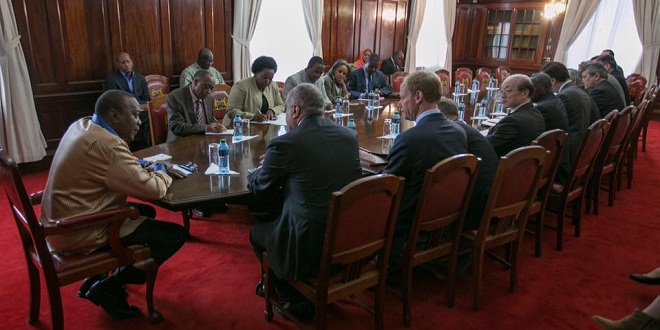
Nairobi, Kenya | AFP |
Kenya said on Wednesday it will delay by six months the closure of the Dadaab refugee camp, the world’s largest, after calls by the UN and aid groups to postpone it on humanitarian grounds.
Interior minister Joseph Nkaissery said the move follows a request from the United Nations High Commissioner for Refugees (UNHCR) to delay the dismantling of the camp, originally planned for this month. It has now been pushed back to May.
“I wish to announce that the government has accepted the request to extend the deadline for the completion of the repatriation of Somali refugees and the eventual closure of Dadaab refugee complex by six months,” he told a news conference.
Nkaissery said a comprehensive repatriation programme would be rolled out next month at the camp, which is home to hundreds of thousands of mostly Somali refugees.
“The repatriation will continue to be carried out in a humane, safe and dignified manner,” he said.
The government announced in May that the vast Dadaab camp in north-east Kenya would be shut down, citing security concerns.
Since sending troops into neighbouring Somalia in 2011, Kenya has come under repeated attack from Shabaab, East Africa’s long-time branch of Al-Qaeda.
– ‘Forcible returns are illegal’ –
Nairobi has taken a hardline position, claiming Dadaab acts as a terrorist training ground for Shabaab Islamists, and has publicly and repeatedly said it would remove all Somali refugees from the country by the end of the year.
“Delaying the closure of the camp by six months is certainly better than deporting the refugees in two weeks. But with the new date… the refugees will continue to feel that they must leave,” said Gerry Simpson, a researcher at rights group Human Rights Watch (HRW).
“Forcible returns are illegal. Kenya must end its threats to close Dadaab and the UNHCR and donors must press Kenya to publicly reassure the Somali refugees and tell them that they are welcome in Kenya until they are able to return home safely.”
In September HRW warned in a report that the repatriation of Somalis from the sprawling Dadaab camp violated international standards and that refugees were returning home involuntarily only to face persecution and hunger.
The Kenyan government dismissed the report.
Refugees will be returning to a country that already has over one million people displaced from their homes, where five million lack enough food and where African and Somali forces are still fighting Al-Qaeda-aligned Shabaab militants.
An estimated 18,000 have returned this year — 10,000 since the announcement of the camp’s closure.
The vast majority of residents of the Dadaab complex of camps close to the Kenya-Somalia border fled Somalia’s more than two-decade-long conflict. Many remain fearful of returning to a country where insecurity remains rife.
 The Independent Uganda: You get the Truth we Pay the Price
The Independent Uganda: You get the Truth we Pay the Price


